SWR Television, 7.05 a.m.
The monastery church of Maulbronn is more than 800 years old, but has lost none of its radiance. The film visits a priest, a bookseller and a vintner who all live with the Cistercian monastery and its stories in their own way. The vintner Frank Jaggy pays his very own respect to the Cistercians who used to live here. He admires the way the centuries-old stone terraces were built for viticulture. Large, modern machines can hardly get through here. So he works entirely in the tradition of the monks, who knew how to use the position of the sun to the best advantage for their fair and monastic wine.
Phoenix, 11.15 a.m.
The most beautiful castles in Europe are presented in this five-part documentary series. The journey takes us to the French Loire, to the German state of Baden-Württemberg, to southern England, to the Italian Piedmont and to Portugal to the castles around Lisbon. Both the buildings are shown and the people who inhabit, maintain or reinvent them. North of the Swabian Alb, in the Middle Neckar region, rises the largest undestroyed baroque palace complex in Germany. The residential palace of Ludwigsburg is linked by extensive avenues to the smaller lakeside palace of Monrepos and the Favorite pleasure palace. Today, the romantic park of Monrepos Palace is home to a newly constructed winery run by Michael Herzog von Württemberg. The tradition of the estate dates back to the 13th century.
3sat, 5.15 pm
Porto is famous for port wine, but also for its nostalgic trams. The most popular is line 1, the "Infante", named after the discoverer Henry the Navigator. A very special railway line, the "Linha do Douro", also starts in Porto. The line runs along the Douro River in the middle of the UNESCO-designated wine-growing region - only there are grapes allowed to grow for the popular port wine.
3sat, 6.45 p.m.
The journey on the Glacier Express is one of the most famous railway journeys in the world: eight hours between St. Moritz and Zermatt with almost 300 kilometres of Swiss Alpine scenery. The steepest section begins before Stalden, at 125 per mille. A little less per mille is served here in slanted glasses on the train - Heidawein. The wine glasses are slanted so that they stand up straight on the table during the steep mountain journey. The wine, by the way, comes from the area.
hr television, 9.00 p.m.
For Bärbel Weinert a difficult summer is coming to an end: heat, drought, little water. Climate change is the biggest challenge of the next decades. Can the Riesling from Geisenheim survive? What needs to be done? Bärbel Weinert sings as a front woman in a rock band - and is the first female director at the Prince of Hesse's winery, in addition to being one of the few successful women outside of family viticulture in Germany. Donatus Landgrave of Hesse deliberately chose the young woman to head his winery in Johannisberg/Geisenheim. The 39-year-old is to make the renowned Riesling business fit for the future: sustainable, ecological, modern and high-yielding - as well as ensuring that the tradition and quality of the successful Riesling are secured for the future.
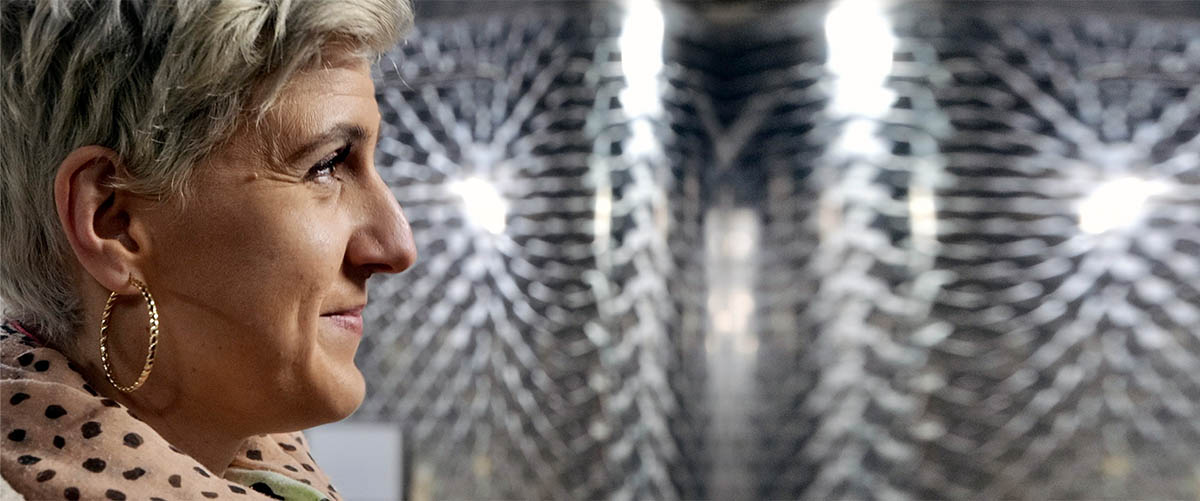 |
Bavarian Television, 10.00 p.m.
In France, a lot is already known about agro-forestry thanks to the work of the agricultural scientist Christian Dupraz. His experimental field in the south of France is now producing better harvests than comparable fields without trees. All around the Languedoc, France's largest wine-growing region, some winegrowers are already planting protective trees between the vines.
NDR Television, 3.00 p.m.
More than 200 people work in Bremen's magnificent town hall, where the Bremen Senate has ruled since 1612 until today. And that's exactly how long the world-famous wine cellar has existed, housing 100,000 bottles from German wine-growing regions.
3sat, 2.05 p.m.
Following the "King of the Alpine Rivers" is a journey of contrasts. It rises at the "Passo della Mauria", flows through Carnia, takes in the Fella from the Canal Valley and flows out of the mountains into the plains of Friuli near Gemona. Further downstream, winemaker Emilio Bulfon has found the best conditions for cultivating old, autochthonous grape varieties on the hills and terraces along the river.
Swiss Television SRF1, 3.50 p.m.
Franziska Gasser (Maike Jüttendonk) never wanted to set foot on her home vineyard in South Tyrol again. Her resentment of her conservative father Josef, who still divides his countrymen into "Germans" and "Italians", runs too deep. However, after her father is incapacitated by a car accident, the studied cellar master rushes to the aid of her mother Theresa, because the grape harvest is imminent and every hand is needed. Franzi is in a dilemma: under no circumstances does she want to take over her parents' winery. She knows that she would not be able to work together with her father. Besides, she can only realise her vision of winegrowing on large vineyards. At the same time, she does not want to abandon her mother.
Bavarian Television, 7.30 p.m.
"Landgasthäuser Burgenstraße" - Rothenburg and Frankenhöhe Franconian culinary delights and sights along the Burgenstraße are on the itinerary of "Landgasthäuser" this time. From romantic Rothenburg ob der Tauber, the route leads through the southernmost vineyards of Franconia to the Frankenhöhe in the Upper Altmühl Valley. This time on the "Landgasthäuser" menu: Winzerroulade with Regent red wine sauce and market vegetables at Restaurant Glocke. Sweet and sour pork leg with potato dumplings at Restaurant Reichsküchenmeister in Rothenburg.
hr television, 8.15 p.m.
In France, it has long been rumoured that Bordeaux is a serious rival to Paris. Bordeaux produced the philosophers Michel de Montaigne and Montesquieu, its architecture is a prime example of classicism, and Bordeaux is the world capital of wine. A visit to the wine museum "Cité du Vin" is a must. Christine Seemann turns her back on the coast and heads east into the heart of the Bordelais to Saint Émilion. The gently hilly wine-growing region was the first to be put on the UNESCO World Heritage List. For Saint Émilion is a synthesis of the arts as it nestles picturesquely into the landscape, full of enchanted nooks and architectural treasures. In September, the Jurade, the wine fraternity, gives permission for the grape harvest - a reason to celebrate. The emotional spectacle enchants not only wine lovers.
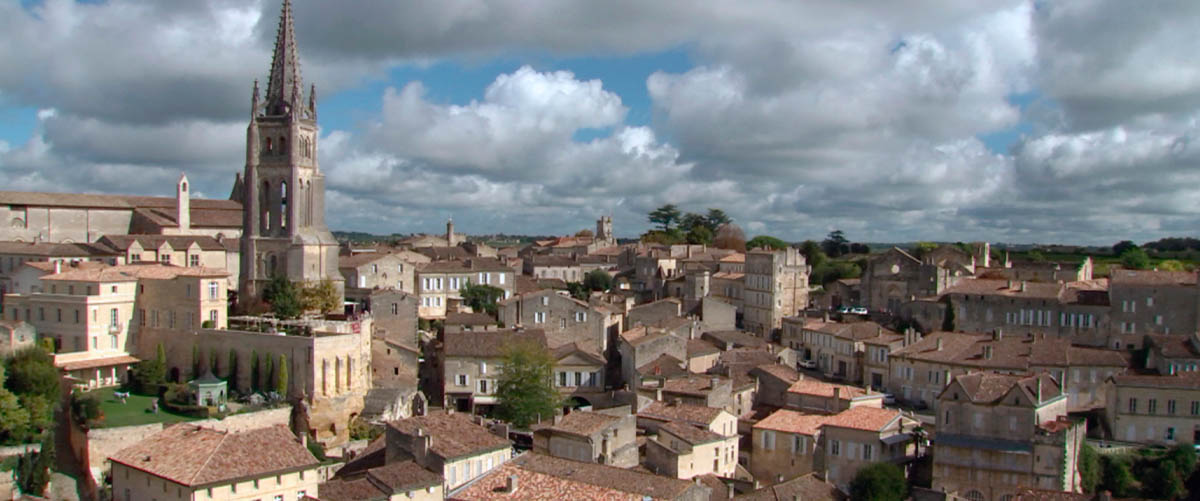 |
SWR Television, 6.05 p.m.
Siebeldingen lies on the Queich in the Südliche Weinstraße district and belongs to the Landau-Land municipality. The village was first mentioned in a document by the Staufer Emperor Friedrich II. It is an ancient wine-growing village with twelve wineries. So it is no wonder that one of the most important streets here is actually called "Weinstraße". SWR presents a winery, a wine tavern, a mill and the Geilweilerhof as a vine breeding institute.
SWR Television, 5.15 p.m.
The Black Forest farm of Rita Sester and her husband Thomas is surrounded by orchards and vineyards. The family delivers the grapes to the local winegrowers' cooperative. All three children, Rita's parents-in-law, relatives and friends help with the grape harvest. The Sesters also offer "sleeping in the orchard" as an adventure holiday in nature - with barrels as sleeping and living oases.
arte, 11.40 a.m.
The new documentary series explores the historical and anthropological aspects of food. It is about everyday food, the importance of bread, wine and spices as well as the change of eating habits over the centuries.
ARD-alpha, 9.30 a.m.
How was the soil we live on formed? What did it look like here millions of years ago? Do geological formations influence agriculture and industry? These and many other questions are addressed in the new series "Geo-Tour". Computer animations bring the Jurassic Sea, among other things, back to life. The Kaiserstuhl - a small, island-like elevation in the middle of the Upper Rhine Graben, famous for good wines and sunny weather. Beneath its surface, the Kaiserstuhl hides an unusual history of its formation. Even during a relaxing fango treatment, geology is at play. But the volcanic rock phonolite not only provides the raw material for wellness treatments, it also produces mystical sounds. Other treasures await discovery in the soil of the Kaiserstuhl: from aromatic truffles to beautiful crystals. Birds travel here from the savannahs of Africa to make their nesting cavities in the loess soil. But how was loess formed in the first place?
ORF 2, 8.15 p.m.
This time the journey takes Hans Knauß and his team to Lower Austria in the northern Weinviertel. For decades this area was marked by an insurmountable border between West and East, called "the iron curtain". This has been history for 33 years, and since then the people of this region have lived in good neighbourliness with the bordering Czech Republic and its population. In the programme, viewers can expect a varied music programme and a characteristic landscape shaped by wine culture. Hans Knauß meets exciting interlocutors and their stories.
arte, 12.45 p.m.
In the stony, mountainous landscape of Crete, olive groves and vineyards stretch as far as the eye can see. The villages of the Mediterranean island cultivate a millennia-old tradition: to wish each other a good day in the morning or to encourage each other, wine is drunk! Whether in the Minoan civilisation, under the rule of the Republic of Venice or the Ottoman Empire: wine is the wealth of the Cretans and still strengthens the spirit of resistance of this people with a strong character.
ARD-alpha, 21.45
We go to the Castello di Brolio of the Baron of Gaiole, who raves about the production of his Chianti at the Ricasoli winery.
WDR Television, 2.55 p.m.
Björn Freitag and Tamina Kallert take a fascinating tour through an underground cellar at a winery where millions of bottles of sparkling wine are stored.
hr television, 4.45 p.m.
After the wine harvest, peace has returned to the Rheingau. A nice opportunity to hike in the colourful vineyards and then enjoy a good meal. Breuer's Rüdesheimer Schloss serves duck stuffed with dates and figs.
NDR Television, 1.45 p.m.
Istria: This part of Croatia is not only extremely popular with summer holidaymakers, but also with gourmets. The peninsula with its rocky coasts in the west, the bathing bays in the east and a hinterland that could hardly be more fertile is one of the best gourmet regions in the country for good reason: the finest truffles, the best olive oil and renowned wines without end. What grows and is produced here meets the highest standards.
Bavarian Television, 7.15 p.m.
On the farm of Adolf and Leopoldine Adelsberger in the small Erlauf Valley there are apple and pear trees from which they produce juices and fruit brandies. Old crafts can also still be found in many places. The Schneckenleitner cooperage in the town of Waidhofen, founded in 1880, has no worries, because its oak barrels are in demand by vintners all over the world.
ZDF info, 10.30 p.m.
In addition to private banks that still exist today, the Rothschilds devote themselves above all to wine-growing. But even though they no longer have a say in the fate of war and peace, the influence of Mayer Amschel Rothschild's five sons on European history can still be felt today.
arte, 10.45 a.m.
The source of the Moselle lies in the southern Vosges, whose dense forests inspired a world-famous theatre. On its sun-drenched slate slopes is one of the steepest vineyards in the world - the Calmont. Along its 544 kilometres, the Moselle shapes a centuries-old cultural landscape and people whose fates have been firmly linked to it for generations. "GEO Reportage" visits fairies and elves, climbs into gigantic power station turbines and flies over the steep Calmont. Kilian Franzen is one of the young and creative winemakers on the Moselle. His vineyards in the Calmont have tradition. The slate soils typical of the Moselle, the steep slopes protected from sun and weather, offer the best conditions for winegrowing.
arte, 12.45 p.m.
Between the alcoholic pleasures of Champagne and Bourgogne, the Vosges offer abstemious refreshment. There are hardly any vineyards in the low mountain region of eastern France - but world-famous mineral springs such as Vittel and Hépar.
3sat, 5.40 p.m.
Heading south, the train meanders leisurely through the Fribourg region. After the tunnel at Puidoux, a magical sight opens up to the train passenger: The vineyards of Lavaux in the foreground, Lake Geneva shimmering blue behind, and the snow-covered slopes of Mont Blanc in the distance. The vineyard terraces of Lavaux have been a UNESCO World Heritage Site since 2007. Christelle Conne's family has run a vineyard here for generations and allows the film team a look behind the scenes.
Bavarian Television, 10.00 p.m.
Patrik Mürner from Lucerne has been a mushroom fan since childhood. The studied product designer has been intensively studying mycelium and fruiting bodies for years and has meanwhile given up his learned profession for this purpose. One of his main areas of research is the remediation of polluted soils with the help of fungi. Soon he wants to use this method to clean up a zinc-polluted industrial wasteland on his doorstep: Biologically clean, instead of packing away and storing the polluted excavation. On an organic vineyard, Patrik Mürner also helps to strengthen the vines with liquid fungal mycelium. And he is tinkering with organic packaging material made from mushrooms, which a Swiss student group wants to market.
MDR Television, 7.50 p.m.
Milesti Mici in the Republic of Moldova is the largest wine cellar in the world with about 1.7 million wine bottles. It is located in an approximately 200 km long tunnel system that was once excavated to obtain building material for the city of Chişinău, which was destroyed in World War II. Viticulture in the Republic of Moldova has a long tradition, similar to that in neighbouring Romania and Ukraine.
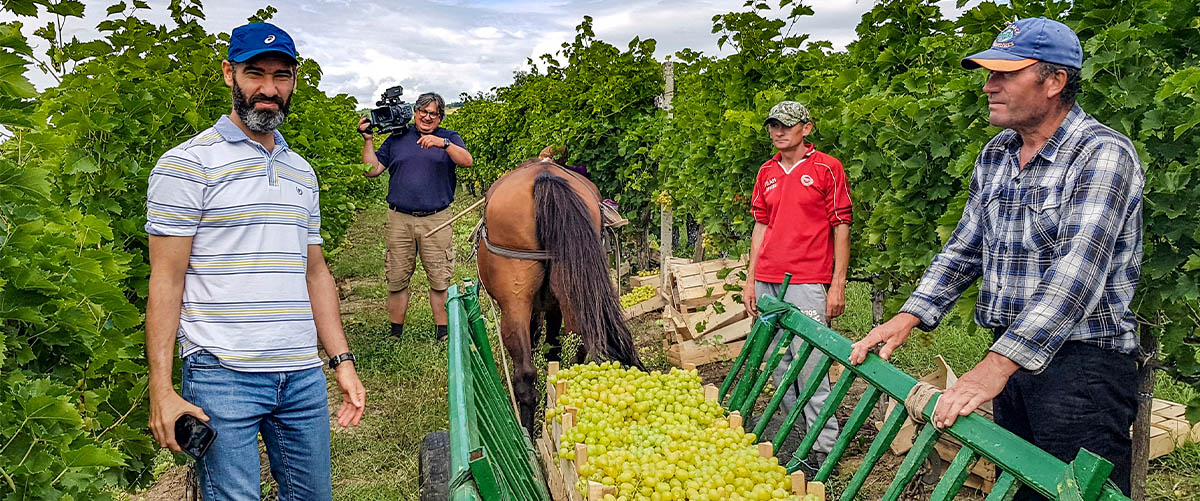 |
DMAX, 10.15 p.m.
Two huge fires have already destroyed more than 18,000 hectares of land in the US state of California. In Napa Valley, the flames are approaching a wine-growing area. There, not only the vines but also production facilities and houses are in danger. Ground troops are trying to contain the inferno with firebreaks. And in Santa Cruz County, a wildfire is moving through stands of oak and redwood trees towards the densely populated areas of Felton and Mount Hermon. There, squad leader Patrick Walker and his team are setting a counterfire.
WDR Television, 21.00
The Ruhr region has been changing since the end of coal mining. And the Emscher is one of the most striking signs: The transformation from an open sewer to a clean and renaturalised river with floodplain landscapes and new life for animals as well as plants. Tina Krachten, the winemaker of the first Emscher red wine, will also be introduced.
hr television, 6.45 p.m.
For Bärbel Weinert a difficult summer is coming to an end: heat, drought, little water. Climate change is the biggest challenge of the next decades. Can the Riesling from Geisenheim survive? What is to be done now? Bärbel Weinert sings as a front woman in a rock band, is the first director at the Prince of Hesse's winery and one of the few successful women outside of family viticulture in Germany. Donatus Landgrave of Hesse deliberately chose the young woman to head his winery in the Rheingau. The 39-year-old is to make the renowned Riesling estate fit for the future: sustainable, ecological, modern and high-yielding.
SWR Television, 9.00 p.m.
Burgenland is considered a special case in many respects. Situated at the foothills of the Alps, this flat land stretches across the east of Austria. Spoiled by the sun and shaped by the wind, this is the famous wine-growing region. For decades, Burgenland was considered an economic problem child: running along the border to Hungary, it was cut off from trade and innovation for decades by the Iron Curtain. But that was yesterday. Burgenland is looking to the future with vision. It is also home to a winegrower who stores his wine not in his cellar but in Lake Neusiedl.
3sat, 2.00 p.m.
Martin Weinek, a well-known actor in Austria, grows the Uhudler, which is controversial among wine connoisseurs, with his wife Eva - and has become its greatest advocate. In the meantime, the two even export to the USA.
3sat, 2.45 p.m.
Slovenia is the land of 1,000 faces. In a very small area you will find wonderful landscapes that could not be more different. There are, for example, the high mountain peaks of the Julian Alps with gorges and river valleys, fascinating caves and karst areas or cheerful wine villages as well as picturesque coastal towns like the Venetian-like Piran.
MDR Television, 9.00 p.m.
With around 500 hectares of vineyards, Saxony is one of the smallest of Germany's 13 wine-growing regions. Here, Goldriesling, Weißburgunder, Kerner, Dornfelder or Spätburgunder are harvested - as well as Traminer and Riesling at the end of the season. In 2022, contrary to expectations, the harvest was quick, short and early - and the result was better than expected. "It will be a good vintage," says Felix Hößelbarth, chairman of the Saxon Winegrowers' Association. That is why the forecast can be corrected upwards a little, he says. "It's a little less than the past harvest, and so we're assuming 2.3 to 2.4 million litres for Saxony." That is five to ten per cent less than in 2021, but the quality is better. The winegrowers were under a lot of stress because of the change in weather at the end of the summer. The problem was not the cold, but the wet, said the head of the association. In Radebeul alone, more precipitation came down than in the previous seven months. "That is less favourable for viticulture." At the beginning of the harvest at the end of August, heat and drought were still expected. That has been reversed. "What usually came in in six to eight weeks came in four to five weeks this time," Hößelbarth said.
arte, 12.40 p.m.
Between the Pacific Ocean and the Sierra Nevada stretch the vast, fertile plains of California, where not only wine thrives. European missionaries brought the wine-growing traditions of the old continent to the west coast of the United States at the end of the 18th century. In the meantime, Californian wine enjoys a worldwide reputation and even received a knighthood in 1976 when the Paris wine jury gave it priority over French products.
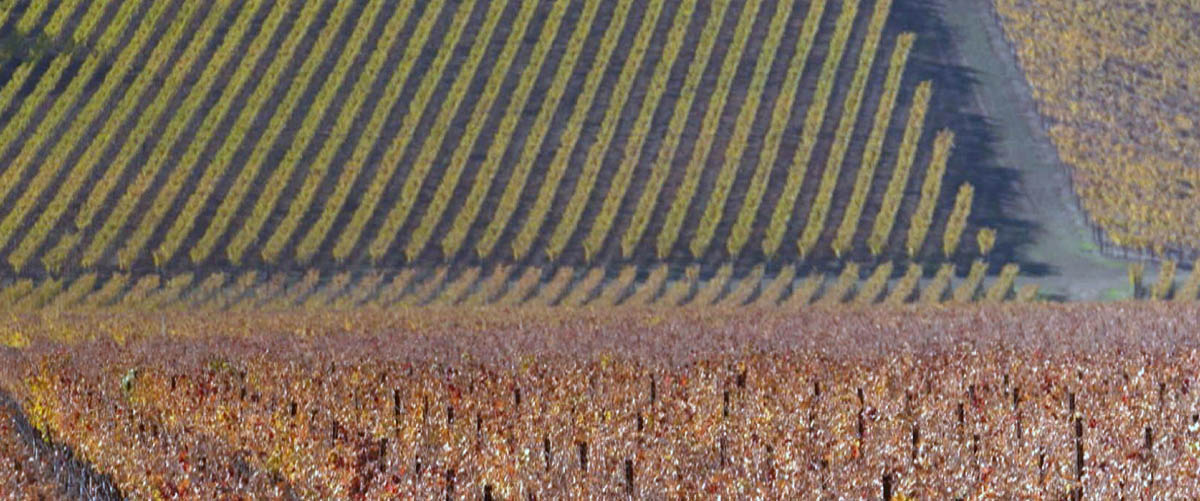 |
3sat, 12.55 p.m.
Young winemaker Sophie Egert (26) and traditional costume expert Simon Stöger (26) bring a breath of fresh air to their parents' family business. Because tradition is their business: while Sophie, together with her brother, is introducing fundamental changes to their parents' business in the Rheingau region of Hesse, Simon Stöger from Upper Bavaria is focusing on consistency. He wants to change only as little as necessary. Both are deeply rooted in their homeland. Winemaker Sophie and Simon, a trained Säckler, i.e. lederhosen maker, love the culture in which they grew up. Wine and village festivals are important events in their lives and from an early age they have been involved in them. Simon is also enthusiastic about Schuhplattler. Sophie has conceived her own sparkling wine brand and Simon wants to counter the traditional costume trend, in which dirndls and lederhosen are becoming mass-produced goods, with traditional and high-quality handicrafts. For both of them it is a tightrope walk to live up to their parents' ideas and at the same time to keep up with the times in order to maintain the businesses in the future.
arte, 5.50 p.m.
It is the comeback of a small river and a whole landscape: The Emscher in the Ruhr area, for decades the dirtiest river in Europe, is being restored from an industrially used sewage canal to a natural river system. Where the chimneys once smoked, there are now lakes, forests and even vineyards. And people are discovering their "Pott", which has been greened up again, as a unique natural region with an industrial history.
3sat, 10.20 a.m.
Nestled between monumental rock formations and azure waters lies Croatia. The country is as varied as its history. The four million inhabitants look back on their past with pride. Traditions are cultivated or brought back to life. The vineyards tell the chequered story of an entire country. Almost 30 years after its foundation, the Republic of Croatia is in the process of rediscovering its wine-growing traditions - and thus also coming to terms with its past.
3sat, 11.05 a.m.
The wine country Montenegro owes its name to the black mountains. And the Montenegrin guide Šuco believes: "You can do cars - but we can do ham, wine and honey."
The programme was disbursed on 22 October 2021 at8.15 pm on SWR television.
The Tauber Valley is not only a paradise for hikers and cyclists, but also for wine connoisseurs. Here you can find wine from no less than three German wine-growing regions: Franconia, Baden and Württemberg. And many extraordinary people and unique sights. SWR presenter Annette Krause first visits the Wille wine farm, which is run exclusively by women. One of them, Michaela Wille, is Tauber Valley Wine Queen, her sister Christina the Wine Princess. Together with her mother and sisters, they run the shop. Without a doubt, the cult wine from the Tauber Valley is the Tauberschwarz - because it can only be grown in this region. The grape variety had fallen into oblivion until it was rediscovered and replanted about 50 years ago. Matthias Balbach remembers how his grandfather once became a Tauberschwarz pioneer and how time-consuming it is to keep this demanding grape variety alive. The small village of Auernhofen is home to two well-known winemakers who grow their wines in the Tauber Valley. Christian Stahl, who caused quite a stir with the names of his wines: whether "Narcotics", "Cold turkey" or "U-Haft", all were sold out in no time. Most of the bottles are said to have been ordered by employees of the police and the public prosecutor's office. He is the chef in his restaurant, where the wines do not follow the food as usual, but vice versa. His immediate neighbour, Stephan Krämer, causes a stir in a different way: his wines are organic, his production methods uncompromising. He calls himself a natural winegrower. While the products cause controversy in his home country, they are selling like hot cakes in the USA, Sweden or Japan. In Bad Mergentheim / Markelsheim, the Jakobshof of the Lehr family offers original trips through the vineyards: in a yellow wooden wagon with lots of music and even more wine. Those who want to spend the night here in the idyll of the vineyards can do so in large, cosy wooden barrels or a trapper's wagon.
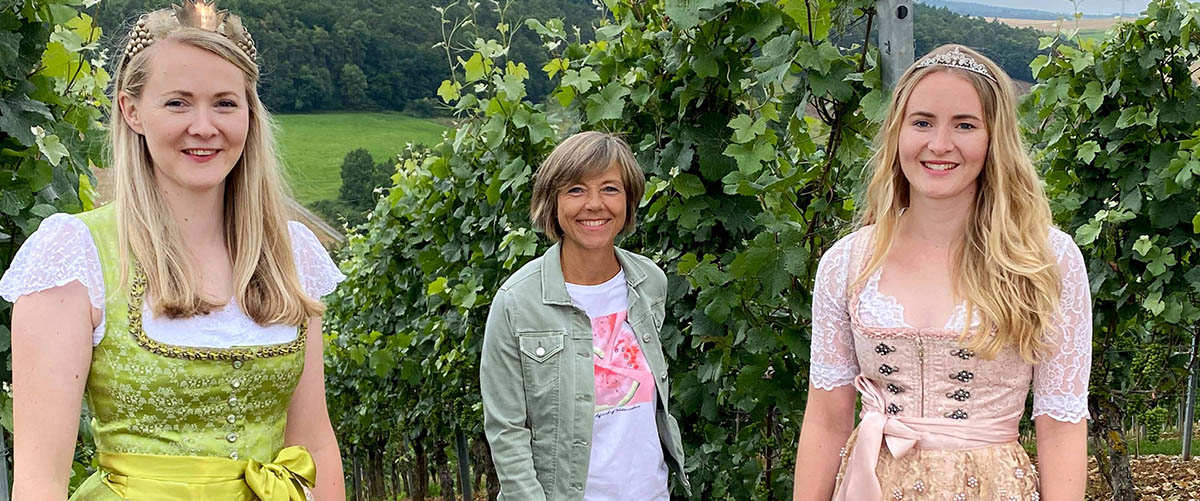 |
Will Riesling still taste like Riesling in 2050? Climate change is taking its toll on vines and grapes. "plan b" shows how winegrowers are looking for ways to save their wine - and the climate along with it. The vineyards suffer from extreme heat and torrential rain. At the same time, wine production causes greenhouse gases that contribute to global warming. The wine world and science are looking for solutions to this dilemma. Estate director Ralf Bengel bears responsibility at the world-famous "Schloss Vollrads" wine estate in the Rheingau. For 27 generations, the noble lords of the estate, the Greiffenclau family, have cultivated a single grape variety: Riesling. And they want it to stay that way. But the weather extremes are attacking the plants. That is why the estate director is working with researchers from the nearby Geisenheim University. Their ambitious goal: to breed Riesling plants that can withstand climate change. Sicilian winemaker Arianna Occhipinti relies solely on the forces of nature. She does not irrigate her plants and trusts that they will root deeper and deeper until they get water from the soil. And that in the south of Europe, where a record temperature of 48.8 degrees Celsius was measured last summer. But making their natural wine entirely without additives pays off - for them and for the environment. Winemaker Franz Wehrheim in the Palatinate is pursuing the goal of making wine completely climate-neutral. He seeks support from management consultant Helena Ponstein. She knows how wineries can improve their carbon footprint - for example in packaging. Packaging is responsible for more than half of the CO2 emissions in wine production.